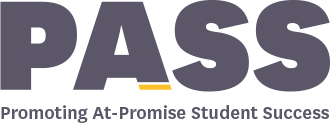ECOLOGICAL VALIDATION
Briefs
Creating a culture of ecological validation to improve at-promise student experiences and outcomes.
This brief provides an overview of how Postsecondary institutions look for approaches to improve student experiences and outcomes.
Leveraging ecological validation to improve at-promise student experiences and outcomes.
This brief provides an overview of Ecological Validation and recommendations for implementation.
Articles
Ecological Validation Model of Student Success: A New Student Support Model for Promoting College Success Among Low-Income, First-Generation, and Racially Minoritized Students.
This 5-year, longitudinal, multimethod qualitative case study draws on data from the Promoting At-Promise Student Success (PASS) project examining a comprehensive college transition and success program called Thompson Scholars Learning Community (TSLC) that serves low-income college students, many of whom are first-generation and racially minoritized. The study presents a new, empirically grounded model for promoting college student success among these student populations called the ecological validation model of student success, where educators validate students' multiple assets, strengths, and innate capabilities for college success across multiple aligned and coordinated support contexts over time. The study extends prior quasi-experimental work demonstrating the effectiveness of TSLC by exploring how educators in the program supported student success and providing a model for other educators, student support programs, colleges, and universities seeking new approaches to better serve an increasingly diverse postsecondary student body.
Promoting at-promise student success through ecological validation.
Higher education often struggles to meet the needs of at-promise students—that is, those from low-income, first-generation, and racially minoritized backgrounds (Kitchen et al., 2021). Colleges and universities graduate students from these backgrounds at much lower rates than their peers despite myriad efforts over the decades to remedy these inequities (Cataldi et al., 2018; Shapiro et al., 2018; Tinto, 2012). The failures of colleges and universities to significantly improve at-promise student success in meaningful ways results from one-size-fits all approaches to student support, siloed and difficult-to-navigate campus environments, and deficit-oriented campus cultures where educators treat at-promise students and their needs as problems that need fixing to “fit the mold” of a successful college student. Leaders in higher education continue to wrestle with these seemingly intractable disparities, and many have piloted novel models to support at-promise students as they navigate postsecondary education.
Scaling success for low-income, first-generation in college, and/or racially minoritized students through a culture of ecological validation.
Drawing from a 5-year mixed methods study of the Thompson Scholar Learning Community (TSLC), we discuss how holistic, proactive, strengthens-oriented, identity conscious, collaborative and reflective norms create a culture of ecological validation wherein at-promise students can experience college success. These norms were then operationalized through the program structures and processes (leadership, socialization, language, space, and communication, ritual and traditions, working relationships and interactions) embedding them into the work of faculty, staff, and administrators. Our study provides empirical evidence of how a culture of ecological validation can provide scaled support for at-promise students. Lastly, this article contributes to the literature by combining three key concepts that have not been explored together—validation theory, college success cultures, and ecological systems theory focused on at-promise students. (PsycInfo Database Record (c) 2022 APA, all rights reserved)

